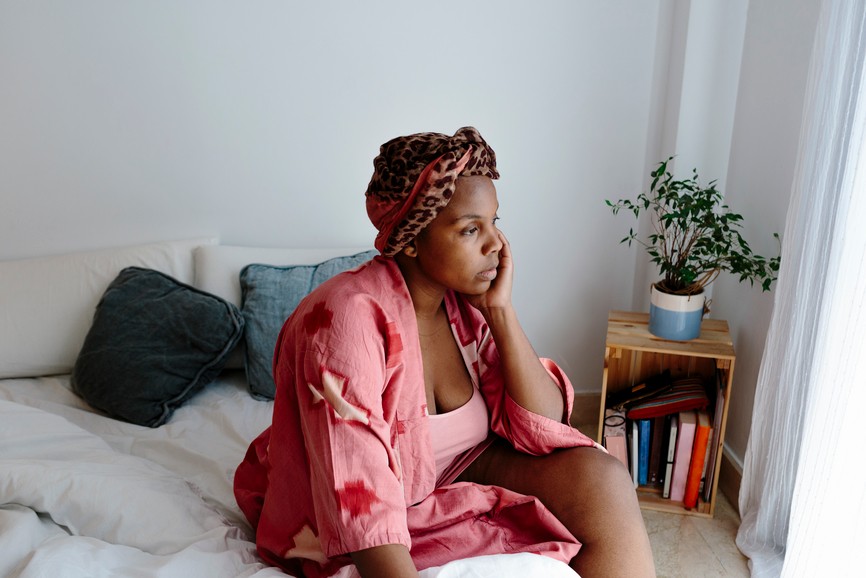We don’t talk about how lonely motherhood is. Or maybe we do, but not nearly…
Relationships
Rising Above Postpartum Depression: The 4 Conversations That Helped This Mama Heal
October 11, 2021 • By Erin Thorp

The phone rang and I saw it was my mom. We often had chats during the daytime so this wasn’t out of the ordinary. I picked up the phone and said, “Hey mom.”
“How are you today, Sweetheart?” she asked.
I burst into uncontrollable sobs. I was crying so hard I couldn’t catch my breath, my toddler came over and helped me put the baby down as I melted off the couch and onto the floor. I knew something wasn’t right, but what was it?
What started out like any other day on maternity leave, at home with my 2-1/2 year old daughter and 5 month old son, was quickly falling apart.
Before the phone rang, I was sitting on the couch breastfeeding my son, watching my daughter take apart the pantry. As she took out boxes of cereal and opened them up to dump the contents on the kitchen floor I remember feeling…nothing.
My mom repeated over and over, “What do you want? What do you need?” I could feel the frustration building as I searched for the answers that were hiding from me.
Suddenly I blurted out “I want to come home! I want to sleep and I want you to take care of these two kids!” “So come home,” she said.
This initiated my first tough conversation with my husband.
“I’m leaving.” This was how I started the call. Followed by, “I’m going to my mom’s, I need some help, I need to sleep, I can’t stay here.” My husband calmly asked when I was going and I said, “As soon as I can get us packed.” He said he would be home in 20 minutes.
I was stunned. How did he know I needed him? I didn’t ask him to come with me?
He came home, we loaded up and I alternated between sleeping and crying while he drove 4 hours to my parents’ house. We arrived, my mom took the kids, I went to bed and I don’t remember much about that time away. I honestly don’t know how long we were gone.
When I finally started to feel rested, I had to come clean about what was going on.
How do I tell my husband how I am feeling without him thinking this is an attack? When I said, “I’m leaving,” he thought I meant I was leaving him. Leaving our marriage and taking the kids with me. That was why he rushed home and took the situation so seriously.
I started with, “I don’t feel like myself.” I knew that whatever this was, it had more to do with me than it did with him.
I couldn’t tell him what or why I was feeling these things, only that I didn’t feel normal. I didn’t feel rested. Food didn’t taste good. I didn’t want to leave the house or shower or get dressed in anything but sweatpants or pajamas.
I always felt behind, like I just couldn’t keep up. I was near tears in every conversation and life just felt overwhelming. I told him I felt responsible for our house and the kids. And while the kids were doing great, the house wasn’t in great shape and neither was I.
He sat and listened as best he could. This was emotional for me, not logical. We decided that I would book a doctor’s appointment when I got home and go from there.
When we got home, it was time for my second hard conversation with my doctor.
It was time to admit what was really going on in my mind. I completed the standard postpartum screening questionnaire and answered his questions. I minimized and brushed aside my feelings because I wanted to feel better.
Looking back I realize I completely bought into the societal belief that motherhood means we are run down, mere shadows of our former vibrant selves.
We talked about medication and treatment options for what he called mild postpartum depression. I didn’t like the idea of medication when he first suggested it. He suggested I try group therapy. I was no stranger to therapy, but I wasn’t thrilled about the idea of a group of moms.
He sat with me and listened as I cried. He urged me to go to one meeting. Just one and then make a decision. The next meeting was the following Monday in the community center basement not too far from my house. I said I would go.
Monday morning came and I didn’t want to go. I was tired, the kids were a mess, and life seemed SO hard. I knew my doctor would ask me if I had gone when I went for my follow-up later that week. I didn’t want to let him down.
This brings me to the third hard conversation.
With myself.
I told myself that I wasn’t going to this group for my doctor, I was going for myself and my family. I was going because I didn’t like living this way. I missed the old me and I wanted to find her again. I am worth taking care of. My kids are worth taking care of. My marriage is worth taking care of.
I couldn’t do any of that if I didn’t take care of myself.
I packed up the kids and myself, attempted to dress everyone which quickly failed, and we set off to my first group counseling session in our sweatpants and pajamas. We walked into the community center where we were greeted warmly.
They had childcare for my daughter. She would be right outside the room where the meeting was, doing crafts and having a snack.
My infant son and I went into the room and another volunteer came up and introduced herself as a ‘baby cuddler’. She was an older retired woman who came to hold babies so moms could get a break. I couldn’t believe this was real. I’m getting a break from these two kids and will actually be able to participate in the meeting? It seemed too good to be true. But it was true.
We made it through that first meeting and went back for many more. Taking the first step to get support was hard, yet it changed my experience with my kids. I eventually decided to start medication and stayed on it until I had returned to work and was feeling stable.
That support group, the childcare, and the baby cuddlers were a lifeline to our family in a time we needed it the most.
This brings us to the fourth and final tough conversation that gave me space to heal postpartum.
With my entire family.
My husband and I wanted to have a third baby. And we decided that if we were going to have baby #3, I would need to be closer to my family so I had access to more support. This led to a series of conversations about where we should live, what house we should buy, or build, and to whom we were going to live the closest.
We ended up selling our house on Christmas Day and moved in with my parents while our house was being built. We had gone from being four hours away by car to sharing the same bathroom. It was overwhelming at times.
After a few months of living in our new house, we were expecting. I had a new doctor this time around and talked openly about my experience with PPD. She advised me that the chances of recurrence are high and that we would monitor things very closely.
Our third child, a second son, was born in early August. I slowly saw some of the signs of PPD return and was proactive in my advocating for my own care this time.
Of all of these conversations, the ongoing conversation with myself is the toughest. Catching myself in negative self-talk. Practicing empathy so that I can act with self-compassion. And remembering that I’m part of a vast group of women with shared experience and wisdom to continue to support my healing.
My biggest lesson? What you want, your greatest desire is on the other side of a tough conversation. Feel the fear and take action. If you don’t know where to start, tell one person you trust what’s really going on. Don’t think past that. Just tell one person and trust that the path will appear.



